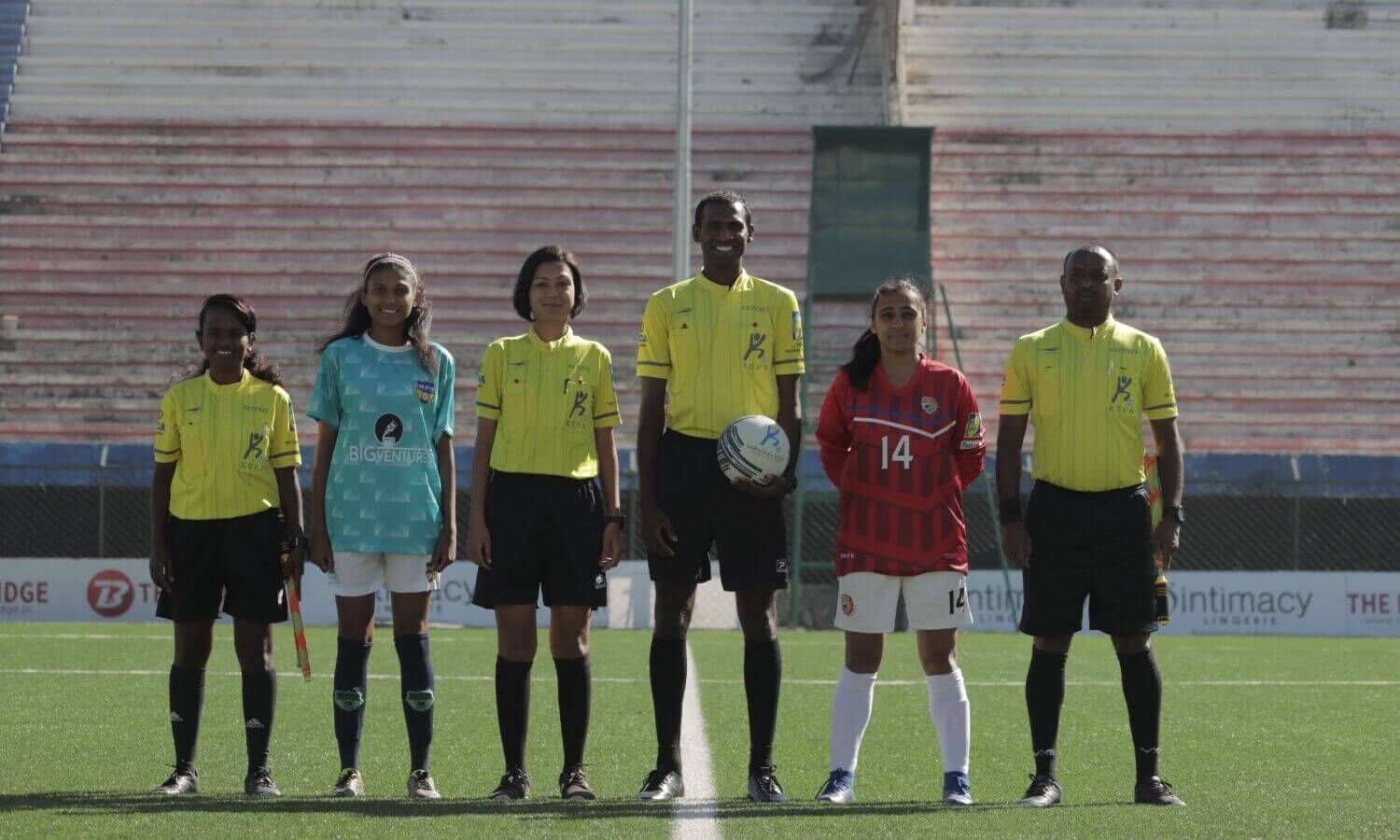Indian Women's League (IWL)
In a male-dominated sphere, female referees like Tulsi are changing the dynamic
Refereeing in India has always been male-centric, but the narrative is changing with the emergence of young female referees.

Tulasi Kumari (third from left) and her colleagues officiating the KWL match between Slamzers Belgaum and FC Bengaluru United
Football and footballers may not get as much adulation in India as a whole when compared to cricket, but the rich footballing legacy of our country has always ensured that the game stays in public discourse almost throughout the year. However, when it comes to referees, it is a different story altogether. With the increased involvement of technology in the sport at a global level, referees and match officials have had a lot of the responsibility, and the pressure that follows with it, reduced. But in India, VAR is still deemed too expensive and with the standard of refereeing in the Indian Super League (ISL) deteriorating with every match, becoming a referee is not something most youngsters dream about, especially girls. That is if you aren't someone like Tulasi Kumari, a young referee who is one of the officials in charge of the Karnataka State Football Association (KSFA) Women's Super Division League games.
Having started off as a football player who took up refereeing on the insistence of her coach almost three years ago, the 20-something year-old has since appeared for the entrance exam for referees at the Bangalore Football Stadium and is currently a category-3 match official. Hailing originally from Nepal but brought up in Bangalore, Tulasi now enjoys refereeing games and is a regular fixture in local matches throughout the year. There is also a sense of continuity in the job, what with there being a pre-decided number of games that one has to officiate in a calendar year. That number ranges from 25 to 30, failing which, the step-up to the next category becomes difficult. Which is why tournaments like the KSFA Super Division are so important. They provide up and coming referees like Tulasi the opportunity to test herself against seasoned officials and continuously strive to improve.
That the women's game in itself has improved by leaps and bounds is another incentive that she hadn't bargained for but is overjoyed with. "The level of football has improved considerably in the past three seasons. I have been associated with the league since 2018 and I now feel that some of the teams here can provide strong competition against even some of the boys at this level which can be only good for football as a whole," she says with a sense of optimism.
With a long future ahead of her still, Tulasi's sole focus right now is to get better every day. "As a woman, I feel the need to push the boundaries in a male-dominated arena and dream of becoming a FIFA referee one day. And of course, eventually I want to officiate in international matches as a referee," is how she sums up her eventual goal.
"For me, one thing that has always stood out is that as a referee, when you step on the football field, there is no seniority or hierarchy. You have the responsibility of officiating a match and your decision is final," she expresses confidently. What also helps is that there are a number of instructors now who keep a close eye on how referees are performing in local leagues and ensure that their training is taken care of. But what about the discrimination associated with most male-dominated professions? "Thankfully, I haven't faced any discrimination till date, neither while playing football nor while working as a referee. I guess that is because there is a sense of community here, as far as the city Bangalore is concerned, and the continuous training and evaluation that we go through facilitates merit to shine through," Tulasi replies without much of a second thought.
As empowering as that might be, the skewed ratio between male and female referees is something that still needs to be addressed. But with the boundaries between men and women, seniors and juniors breaking down in the refereeing ecosystem in India, things are looking up for young girls who want to become national level referees in the future. Hopefully, in the days to come, we'll see more people like Tulasi officiating ISL and I-League games.
(Image credits: Md. Arsalan)
